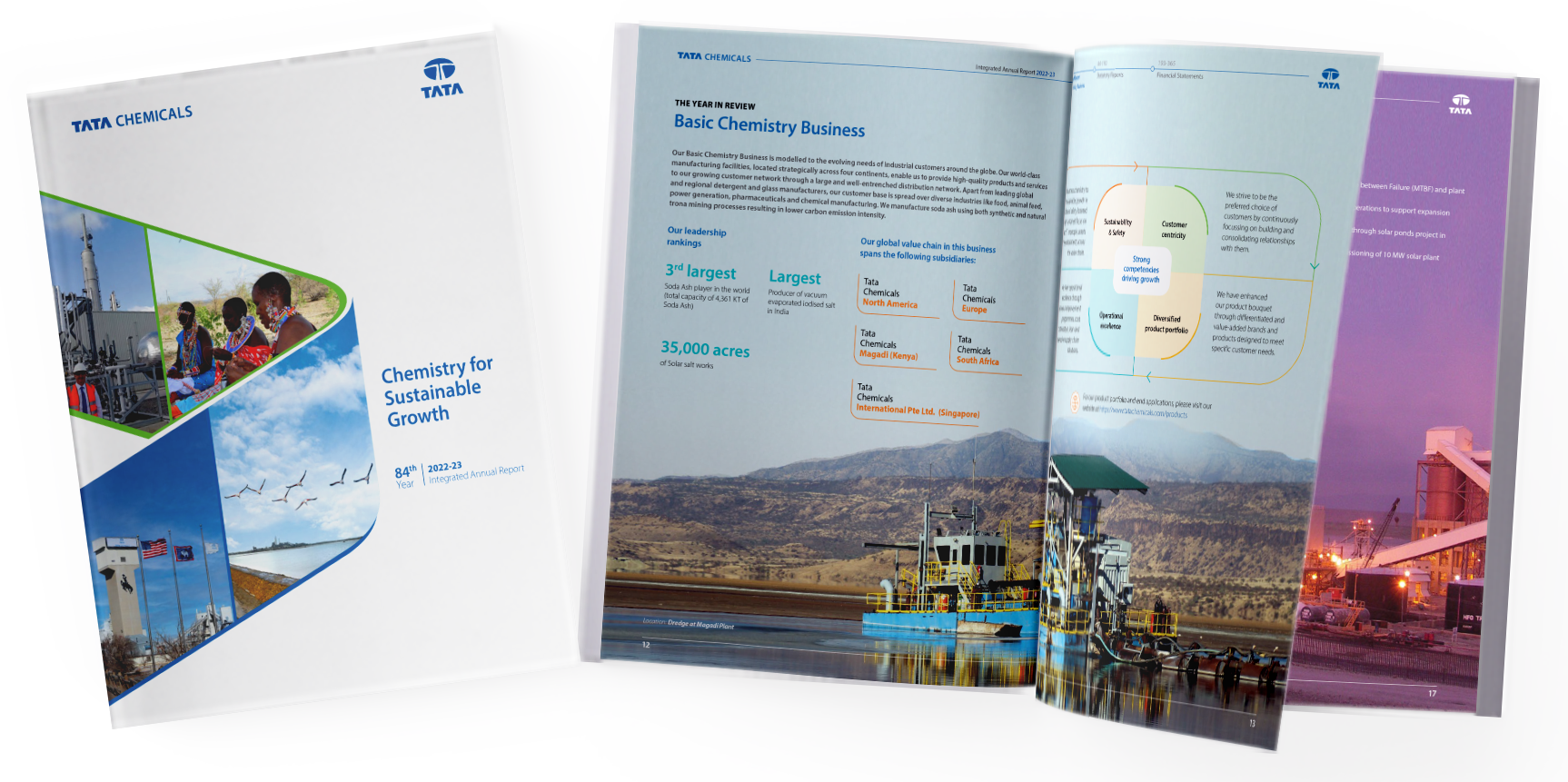India
Tata Chemicals undertakes a plethora of initiatives to conserve natural resources and reduce emissions and waste at its operations, across geographies.
 PLASTIC WASTE MANAGEMENT
PLASTIC WASTE MANAGEMENT
Every day, tonnes of plastic waste are discarded all over the world. The impact of plastics includes environmental degradation, threat to marine and animal life, lethal effects on health and serious cause of pollution. Close to 85% of the objects found on beaches contain traces of polymers, most of which are packaging materials. According to a study conducted by the Central Pollution Control Board (CPCB), in 60 major cities in India around 25,940 tons/day of plastic waste is generated, of which around 94% comprises thermoplastic content, which is recyclable such as PET, LDPE, HDPE, PVC, etc. The remaining 6% belongs to the family of thermoset plastics and other categories of plastics such as sheet moulding compound (SMC), fibre reinforced plastic (FRP), multi-layered, thermocol, etc, which are non-recyclable.
Now, CPCB has laid down technical options for safer disposal of plastic waste such as road laying, co-processing, etc. Owing to the detrimental impact of plastic waste dumped into our ecosystem, government bodies, academic institutions, NGOs and businesses have begun undertaking several initiatives to curb the use of plastic as well as implement safe and eco-friendly disposal methods. As consumers, we too have an important part to play in the success of the recycling initiative. We can do our bit by segregating recyclable plastic and following the instructions provided by the municipality or government bodies to make the process easier and cost effective. If you live in a location where plastics are collected through a take-back program, do ensure you send your plastic waste to the nearest collection point.
The reckoner below outlines the disposal guidelines for different categories of packaging material used, such as multi-layer plastics, paper and PET. The purpose of this reckoner is also to provide an opportunity for more consistent communication with our consumers in order to make informed decisions on how to capture recyclable material for recycling thereby reducing environmental pollution.
Disposal guidelines
The disposal guidelines are brand independent. The images of products are for illustrative purpose only. Consumerism has increased the amount of plastic waste generated, and hence a 'circular economy' is imperative to facilitate the integration of economic and environmental well-being in a sustainable way. As a consumer goods industry, we need to overcome the challenges of the linear model” 'take-make-dispose', by moving to 'circular economy' with a focus on improving recycling, promoting re-use, and redesigning products.
 Energy
Energy
Energy is a significant material aspect for Tata Chemicals. Energy-related goals are taken according to the Balance Score Card and Responsible Manufacturing Index.
Mithapur uses coal with co-gen facility. A small quantity of wind power is used by Mithapur in its township. The cement production at Mithapur falls under the Perform, Achieve & Trade (PAT) scheme.
To manage the downstream energy consumption, TCL dispatches more than 90% (touching 98% for TCNA) volume of its total products through rail transport. We use highly efficient state-of-the-art product transporting modes such as Lupa Bulkers, ISO tankers.
We have various energy savings drives at our warehouses and CFAs for Soda Ash and Salt.
 Emissions
Emissions
Emissions are critical to the organisation as they have impact on climate change and air quality. Emission-related goals are measured against Balance Score Card and Responsible Manufacturing Index. Over the years, TCL has introduced internal norms to provide a safer and better environment for the surrounding communities. The stacks are monitored as per the schedule made under ISO 14001 and results are well within the limits. Furthermore, all environmental regulations are being adhered to, and in-house monitoring is done on a daily basis. Half-yearly external monitoring is also done by a third party. The organisation measures emissions from the combustion processes using continuous emission and opacity monitors. Combustion of natural gas and coal for electrical and steam generation result in NOx and SOx emissions.
Emissions at Mithapur are reduced by taking up initiatives like MUW FBD and vacuum system modifications, utilisation of effluent solids in cement manufacturing, renewable energy generation by wind mill and increase of production of bicarbonate.
 Water
Water
Water being a significant natural resource, is an important issue for Tata Chemicals. All measures to reduce water usage are implemented and water sources are metered and monitored regularly. The organisation has set forth stringent targets year-on-year to reduce water consumption, and reviews them on a weekly basis. TCL, India carried out a detailed water footprint and sustainability assessment as per the Water Footprint Network Netherlands methodology. Direct product water footprints and site water footprints were established for blue, green and grey water.
TCSRD (Tata Chemicals Society for Rural Development) has been implementing various water conservation projects especially in Mithapur region, where non-availability of quality water is a big concern.
 Waste
Waste
Tata Chemicals focuses on effective integration with the basic philosophy of resource optimisation, use of alternative sources and maximisation of “recycle and reuse” by innovation. Waste tends to degrade the environment if not managed suitably.
Hazardous and non-hazardous waste
Minimising the amount of waste produced is the key objective of Tata Chemicals from both an economic and an environmental perspective. We have implemented on-site segregation of waste at all the sites. As per the classification, all hazardous and non-hazardous waste across locations is sold to authorised and registered dealers and organic waste is composted.
 Climate change concerns
Climate change concerns
Tata Chemicals’ sustainable enterprise strategy has always focussed on green technologies and used clean development mechanisms. Tata Chemicals has adopted the Climate Change policy issued by the Tata Group, which includes mapping carbon footprints and creating an abatement strategy for sustainable manufacturing. TCL’s strategy includes identifying opportunities for carbon abatement, investing in low carbon growth and tapping into opportunities presented by the emerging low carbon technologies. It has also adapted its businesses to become energy-efficient, use less water, and innovate with new chemicals, fertiliser products and agri-services for carbon conscious growth.
We have in place processes that help transcend mere compliance, ensuring that we continuously improve to manage and address risks including those arising out of climate change. The improvement projects focus on specific energy consumption, emission reduction, water consumption reduction, etc., which reduces not only the carbon footprint but also the costs.
In the absence of mandated carbon emission cuts, TCL has chosen a path which balances the imperatives of growth while ensuring measurable action on climate change; it leads to a carbon-managed future. We have drawn a three-pronged strategy, which includes identifying opportunities for carbon abatement, investing in low carbon growth and tapping into opportunities presented by the emerging low carbon technologies. We actively monitor our existing products and services, and also invest in developing new climate-friendly products through innovation and research.
We are also addressing energy efficiency issues directly by waste reduction initiatives and novel technological advances which offer the prospect of utilising low grade heat, further enhancing energy efficiency and reducing GHG emissions.
The Carbon Disclosure Project (CDP) is an international, not-for profit organisation providing a global system for companies and cities to measure, disclose, manage, and share vital environment related information. It works to transform the way the world does business to mitigate the effects of climate change and protect our natural resources. TCL is responding to CDP since FY 2008-09 for climate change and has achieved 99 score with 2nd position in the Carbon Disclosure Leadership Index (CDLI) for FY 2014-15.
 Natural capital
Natural capital
As per Natural Capital forum, natural capital can be defined as the world’s stocks of natural assets which include geology, soil, air, water and all living things.
It is from this natural capital that humans derive a wide range of services, often called ecosystem services, which make human life possible.
The most obvious ecosystem services include the food we eat, the water we drink and the plant materials we use for fuel, building materials and medicines. There are also many less visible ecosystem services such as the climate regulation and natural flood defenses provided by forests, the billions of tons of carbon stored by peat lands, or the pollination of crops by insects. Even less visible are cultural ecosystem services such as the inspiration we take from wildlife and the natural environment





